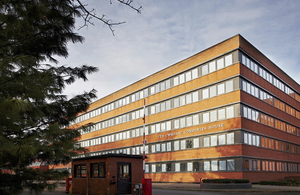Having already congratulated you on assuming the Presidency, and assured you of my delegation’s support, when I took the floor at our meeting on Tuesday morning, let me begin by thanking everyone who has been involved in putting the arrangements in place to allow us to get this 2021 session of the Conference on Disarmament underway. The limitations of this virtual format are clear, and we eagerly look forward to being to resume in-person meetings as soon as the situation allows; but it is very important that we have been able to begin our work on schedule, even in the current exceptionally trying circumstances.
Let me also add my welcome to those new colleagues joining us for the first time today; I look forward to working with them.
I would also like to take this opportunity to express my delegation’s deepest sympathies to those who have lost loved ones and suffered hardships during the Covid-19 pandemic, and our solidarity with all countries that have been affected. The pandemic only serves to underline the importance of the international community working together to resolve global challenges; that goes for this Conference too. Mr President, I would like to take this opportunity briefly to set out the priorities for my delegation for the coming year.
Our focus is clearly on the delayed Tenth Review Conference of the Nuclear Non-Proliferation Treaty, which we hope can go ahead in August. For fifty years, the NPT has provided the framework for the extension of the benefits of the peaceful uses of nuclear energy, for the minimisation of the proliferation of nuclear weapons, and for significant nuclear disarmament. At the Review Conference, we will celebrate this achievement and reaffirm our commitment to the Treaty in all its aspects.
While the NPT is the indispensable and irreplaceable framework for plotting a course to a world without nuclear weapons, it is this Conference that is charged with negotiating the instruments that will turn that aspiration into reality. Given its membership and its mandate, there is no alternative body that can do that. As such, perhaps the greatest contribution this Conference can make to the success of the Review Conference is to show that it is ready to fulfil that responsibility, notably by commencing negotiations on a Fissile Material Cut-off Treaty. My delegation continues to believe that there is no outstanding issue that cannot be resolved during the course of negotiations.
This Conference also has a crucial role to play in preventing an arms race in outer space. The United Kingdom was proud to be the original sponsor of UN General Assembly resolution 75/36, entitled ‘Reducing space threats through norms, rules and principles of responsible behaviours’, and we were gratified and encouraged by the very broad support for it shown by Member States. That resolution mandates the UN Secretary-General to produce a substantive report on the question as a basis for further discussions, and we encourage all members and observers of this Conference to contribute to it. The resolution also invites members and observers of this Conference to inform it of their national space security policies, strategies or doctrines, on a voluntary basis, in accordance with and in support of its mandate. We look forward to having the opportunity to do so during this session.
More broadly, Mr President, my Government will soon publish the results of its Integrated Review of Security, Defence, Development and Foreign Policy, which will define the long-term aims for our national security and foreign policy. We undertake to brief the Conference on the aspects of the Integrated Review that pertain to the UK’s nuclear weapons policy and to disarmament, non-proliferation and arms control more generally once it is published.
Mr President, We warmly welcome the proposal you circulated already in December on behalf of the six Presidencies of this session for a package pertaining to a Programme of Work for 2021. My delegation has consistently supported the creation of Subsidiary Bodies to work towards negotiating mandates on the core issues, and consultations on issues related to the improved and effective functioning of the Conference. We also continue to support the proposal of the delegation of Australia to render the language of the Rules of Procedure gender-neutral. This is a specific, technical measure which has no bearing on wider questions of the improved and effective functioning of the Conference, and which should therefore face no impediment to swift adoption.
The events of Tuesday morning leave us under no illusions, however, that it will be easy to reach consensus even on issues which should be technical and procedural. I made my delegation’s position on the blocking of applications for observer status by Iran and Turkey clear then, and do not intend to repeat it now. I would simply express the hope that our actions for the rest of this session, beginning with the swift adoption of a Programme of Work on the basis of your proposed package, can serve to rebuild the credibility of this crucial body, recognising the importance of the problems before us and the vital interest of all states in our success.
As we mark the 75th anniversary of the first meetings of the United Nations in London this month, I would like to finish by remembering the words of a man who was present at the creation, and went on to become a legendary UN official – Sir Brian Urquhart, who sadly passed away a few weeks ago at the age of 101. He once said of the UN, “three-fourths of the time, you achieve nothing, but every once in a while, it works just enough to make it worthwhile. From day to day, one thinks it hopeless, but cumulatively, it does work”. Let us use our time this year wisely, work tirelessly, respectfully and creatively to bridge the differences that persist among us, and make our Conference work just enough to be worthwhile.


